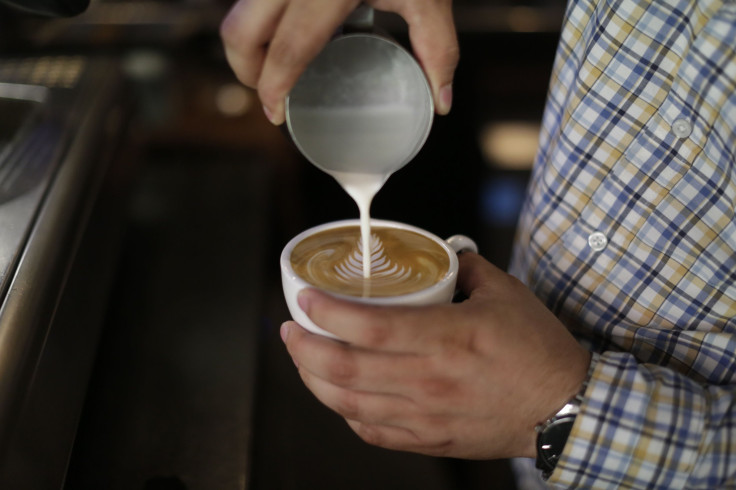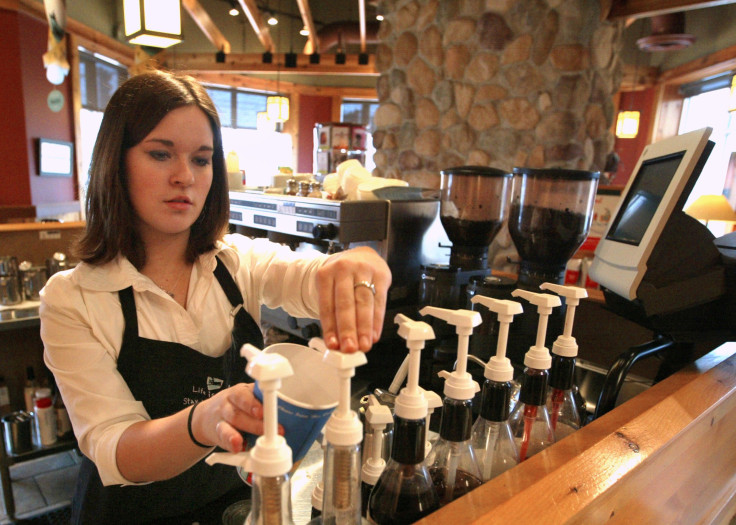Is Coffee As Addictive As Drugs?

Have you ever wondered if you are addicted to coffee when you are unable to start your day without a cup of the hot beverage? Well, you may be right.
According to the findings published by the U.S. Food and Drug Administration in fall 2007, about 80 percent of Americans consume caffeine every day.
"Caffeine is the most frequently self-administered drug in recreational use worldwide today," Dr. James Bibb, assistant professor of psychiatry at UT Southwestern Medical Center at Dallas, Texas, was quoted as saying in a report published by science news website EurekAlert in 2002. "And yet we know little about how caffeine works in the brain, whether with the kick from a double espresso or small jolts from tea or cola. We do know it is rewarding, can enhance cognition and performance, and induce dependence at the same time."
When one consumes food substances like coffee, colas or chocolate, caffeine gets absorbed into the bloodstream that eventually travels to one’s brain and blocks adenosine receptors — one of the four building blocks of DNA that work as a signaling molecule in the neurological system. Adenosine also regulates the energy-storage molecule ATP, also referred to as "molecular currency" of intracellular energy transfer.

When caffeine blocks adenosine from doing its job, the brain is unable to communicate with the other cells of the body properly, failing to send warning signals at times when one is fatigued, hence resulting in the additional hours of mental alertness. When adenosine is blocked off, other stimulants like dopamine are also produced at a greater rate than usual, creating the jolt of energy that people who drink coffee often talk about, according to the website for Clarity Way Drug and Alcohol Rehab Center in Pennsylvania.
As a result, the body starts creating additional adenosine receptors over time to replace those being blocked by caffeine. This is when the body starts craving increased quantities or stronger doses of caffeine to recreate the same jolt that it produced with smaller quantities earlier.
If one completely cuts off from coffee during such times, the receptors become doubly active since they are no longer being blocked and start performing their duties with renewed diligence. As a result, the body feels tired and an individual feels irritable. Other symptoms include anxiety or jitteriness, fatigue, headache, lack of concentration and depression. Withdrawal symptoms can last for days or weeks, depending on the amount of coffee an individual is used to of consuming every day, according to Clarity Way.
However, most doctors do not see caffeine addiction as a serious problem because following a withdrawal, one does not require to check into a rehabilitation center for prolonged periods of time, get checked out by a medical professional. Individuals with caffeine addiction also do not usually demonstrate antisocial behavior unlike people addicted to drugs or alcohol.
Also, there is a risk of suicide and overdose involved when one is trying to quit recreational drugs, which obviously is unheard of in people who stop consuming coffee, according to National Library of Medicine. Fifty percent of cocaine users face an array of mental health issues that deter the recovery process of drug users looking to leave their addiction behind.

This may be the reason why the National Institute on Drug Abuse (NIDA) for Teens does not recognize coffee as a source of addiction. Caffeine causes small surges in the dopamine levels in the brain which is not significant enough to cause an addiction that is typically caused by recreational drugs. "The reality is that caffeine does not produce these compulsive patterns that you see with other drugs [that lead to] catastrophic consequences, so, in that respect, caffeine is not addictive in the same sense," Neurologist Nora Volkow, director of the National Institute on Drug Abuse, was quoted as saying by VOA News in a report published in 2015.
However, Laura Juliano, a clinical psychologist at the American University, while agreeing with Volkow’s observation, warned that excessive consumption of caffeine can cause negative symptoms such as headaches, nausea, flu-like symptoms, and excessive fatigue.
In some cases, people have even died because of caffeine addiction. One such case was reported recently when Davis Allen Cripe, 16, from Chaplin, South Carolina, died on April 26, after consuming too many caffeinated drinks. Cripe had consumed three back-to-back caffeinated drinks — a café latte, a large Diet Mountain Dew and an energy drink — within a period of a few hours, which caused him to collapse in the middle of his classroom in Spring Hill High School.
However, it is always difficult to tell how someone’s body will react to the intake of coffee since there is no apparatus to measure the human body’s tolerance to caffeine, according to experts. Nevertheless, the safety standard set in place regarding the amount of caffeine intake for a human body is 400 mg, which is typically followed by 90 percent of Americans, Health, a lifestyle website, reported.
© Copyright IBTimes 2024. All rights reserved.






















